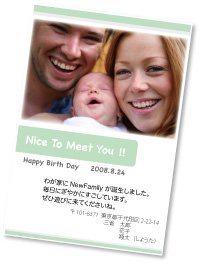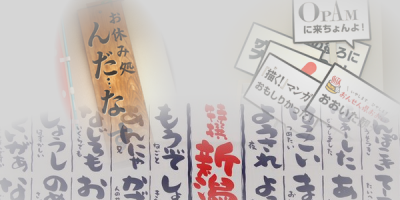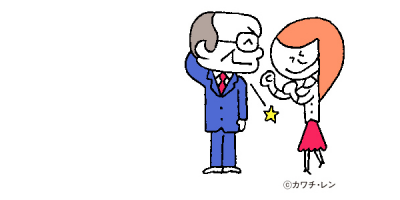
As this post goes up, I’ll be in a certain city in a certain country. I’m somewhat intimidated, as I’ve heard that in that particular country beardless men are treated like children or are seduced by homosexual men. I’m dubious about these rumors, but nonetheless I am growing a beard for the first time in my life. Acquaintances ask “Are you growing a beard Mr. Sadanobu?” whenever I meet them. “No, actually it’s for an overseas trip,” I say, then hurriedly explain the situation. As everyone knows, my character is very serious and “square.” I am incapable of changing myself into a sexy, wild character.
My mutual friends got married, and sometime later announced the birth of their child. Although I was happy for them, it forced me to think about their relationship as “man” and “woman.” Then making babies. Hmm. I really don’t want to picture them in the act.
These frequent, everyday shocks brought about by “some guy I know” cannot be explained by the idea that we “selectively use different styles of speaking for different people.” For example, consider two lovers sweetly cooing to each other:
“Ne-, ohiru nanni shuru–?”(1) (What should we have for lunch?)
“Nn, wakannai deshu–.” (I don’t know.)
Yet, the couple would be mortified if they were somehow overheard by their relatives or acquaintances. Even if they tried to proudly assert, “We always use an appropriate style of speech when dealing with people, and with each other we use a particularly intimate style of speaking,” this would be nothing more than piling shame on top of shame. The problem is not the “selective use of speaking style;” it is a problem of character (“Ugh! That guy turns into a baby when he’s with his girlfriend!”).
Certainly, the idea of “selective use of speaking style” is not universally inapplicable. What about asking the CEO of a client company to do something for you, versus asking your own subordinate? When asking the CEO, you might courteously say to her “I really appreciate your help,” with a bow of the head. In the case of your subordinate, you might slap him on the shoulder and lightly intone, “Please get to it.” Even if you are seen by the subordinate making such a polite request to the CEO, you would not be particularly embarrassed. Likewise, it would be no big deal if the CEO saw you making a brusque request to your subordinate. The same message (“please do it”) is changed in style to fit the relationship you have with the other person.
On the other hand, consider a person who obsequiously begs the CEO, “Thank you so much for all your help in the past! I am most indebted to you regarding the matter we discussed!” bowing low and rubbing his hands together, then stretching out feet on his desk, glowering down, and shouting “You! Quit slacking off!” He would not want either party to see his behavior in front of the other. In this case it is not so much that he “selectively uses speaking styles to fit his relationship with the other person,” but rather that he transforms into “a different person” altogether.
That isn’t to say this change is so fundamental that he literally becomes a “different person.” In Toshio Shimao’s (1917–1986) novel, Kisousha no Yu-utsu, there is a scene in which the wife, who after saying, “It’s my fault. Please don’t go,” while quarreling with her husband, suddenly says in her native Amami islander dialect, “Mama! Take me away!”(2) Coming to her senses, she switches back to standard Japanese saying, “What’s wrong with me?” Her memories of the time during which she spoke in island dialect were discontinuous, disappearing when she resumed speaking in standard Japanese. Unlike this sort of fundamental change (which we can provisionally call a change of “personality”), in the changes we described above both the language and memories are contiguous.
What I am talking about here is not style. It is not expected to change, unlike styles, which can be freely altered to fit the person to which one is speaking. And if they do change, the observer is quickly lead to any number of conclusions about the speaker—“this person has been deceiving me,” “this person crumbles in the face of a strong adversary,” “this person is completely different around her lover” etc.—making both the observed and observer uncomfortable. What I am talking about is not quite as fundamental as personality though. Characters, such as those introduced in my second essay (“the cool person,” “the serious person,” “the vulgar person”), exist on a level “higher than styles, lower than personae.”
* * *









(1) This phrase and the one that follow it are written in the Japanese equivalent of “baby talk.”
(2) It would be difficult or impossible to convey in translation the extent to which this character’s Amami accent diverges from standard Japanese. For those interested, the exact quote is: “Anmai, wandaka, teretitabore.” (Explanation and quotation provided by Prof. Sadanobu.)